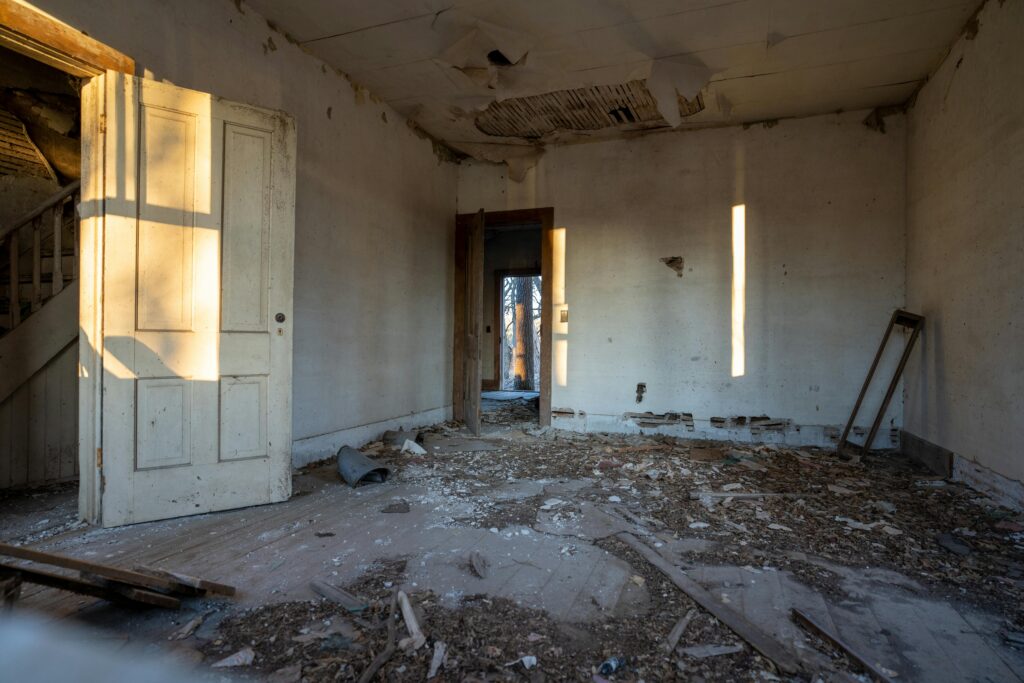Yes you can, but it can be complicated. As an alternative, bridging loans can be one of the most flexible and fast options when buying a derelict property.
There’s something very exciting about spotting a derelict or neglected property that’s full of potential.
The idea of transforming a forgotten space into a beautiful home or profitable investment is hugely appealing to many.
But financing a project like this isn’t always easy…Most high-street lenders are wary of providing mortgages on properties that they deem ‘uninhabitable’, and you may find yourself facing a wall of rejection if you’re relying on a traditional mortgage.
Fortunately, there are other options – let’s explore them.
What Are My Funding Options For Buying A Derelict House?
While a standard mortgage might be off the table, you’re not out of options.
Your funding choices will depend on the condition of the property and your plans for it.
Here are the most common finance routes for derelict or uninhabitable properties:
- Bridging loans – Short-term, flexible loans designed to bridge the gap between buying and refinancing or selling.
- Renovation mortgages – Specialist loans covering both purchase and refurbishment costs, though often hard to secure without solid plans.
- Mortgage retention – A lender may agree to release funds in stages, holding back part of the loan until key repairs are completed.
- Second charge mortgages – Loans secured against the equity in an existing property, but higher risk if things don’t go to plan.
- Private finance – Friends or family may fund the purchase or renovation, but personal relationships can complicate matters.
Of these, bridging finance is usually the fastest, especially when you’re working to tight timelines, such as auction deadlines or planning urgent works.
Can I Borrow More Money Than The House Is Worth With A Mortgage?
With a traditional mortgage, the lender bases the loan on the current market value of the property. That means the price it can be sold for at the time the mortgage is given.
If the house is derelict, that value may be so low that you won’t be able to borrow enough to both buy the home and fix it up.
However, some lenders allow you to borrow based on the property’s projected value once it’s been renovated – this is called the Gross Development Value (GDV).
This is where bridging loans come into their own. Structured correctly, a bridging loan can cover both the purchase and renovation costs, with repayment due once the property is mortgageable or sold.
It’s a common route for investors and developers who need quick access to cash and the flexibility to fund major works.
Looking for a loan to finance a renovation project? Get in touch with the team at Blue Square Capital for a no obligations quote.
Is It Worth Buying A Derelict House?
If you’ve got a realistic budget and the right financial support, buying a derelict house can absolutely be worth it.
These properties often come at a significantly lower price, and with the right renovation, you can add a lot of value – either to sell on or enjoy as a your own home.
But it’s definitely worth approaching with caution. Derelict properties almost always come with hidden costs: damp, structural issues, outdated electrics, asbestos, or roof problems. Renovation timelines can easily stretch, and budgets often need a buffer of 15–20% to cover surprises.
To make the most of the opportunity, it’s important to have a funding option that allows you to act quickly but flexibly. A short-term bridging loan, repaid once you refinance or sell, can provide that breathing space.
What Property Is Not Suitable For A Traditional Mortgage?
Mortgage lenders want reassurance that a property is easy to sell if the borrower defaults. The worse condition the property is in, the more undesirable it is to potential buyers – making it a risky asset.
Because of this, the following issues often make a home unmortgageable:
- No working kitchen or bathroom
- No running water, heating, or electricity
- Fire damage or structural instability
- Unsealed windows or unsecured doors
- Severe damp, mould, or presence of asbestos
- Japanese knotweed within proximity
- Flats in high-rise buildings with no lift
- Properties above commercial premises
- Non-standard building materials or construction
- Auction properties (due to short turnaround times)
If the property you’re considering ticks any of these boxes, it’s likely that traditional mortgage lenders will pass – at least until renovation works are completed.

On What Grounds Can You Be Refused A Mortgage?
Even if the property isn’t outright derelict, lenders can reject your mortgage application based on:
- The property’s resale value being deemed too low
- Non-compliance with building regulations
- Multiple kitchens, indicating potential for unregulated multi-occupancy
- A lack of planning permissions
- Personal circumstances such as poor credit or insufficient income
This is where working with a financial specialist becomes important. Having an alternative plan, like a bridging loan, can mean that your project doesn’t stall before it starts.
Are Bridging Loans Good Options For Buying Derelict Properties?
In short – yes. Bridging loans are often the most practical and realistic way to fund buying and renovating a derelict home.
Why?
- They’re fast to arrange – ideal if you’re buying at auction or need to secure a deal quickly
- They’re flexible – you can borrow based on future value, not just current condition
- They’re exit-driven – approval focuses on your ability to repay, not just your income
- They can include both purchase and renovation costs in one facility
Once the property has been restored and is considered habitable, you can refinance your bridging loan onto a traditional mortgage with a lower interest rate, or sell the property to repay the loan and realise your gains.
At Blue Square Capital, we specialise in helping property buyers secure the finance they need for projects just like these. Whether you’re a first-time renovator or a seasoned investor, we can walk you through your funding options and structure a bridging loan that works for your timeline and budget.
Looking To Fund Your Renovation Project?
If you’ve found a derelict property and want to move quickly, get in touch with Blue Square Capital. We’ll help you talk through your options and tailor a bridging loan to your exact needs – so you can focus on bringing your vision to life.
Enquire today to find out how we can help you fund your fixer-upper.


